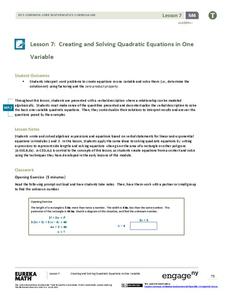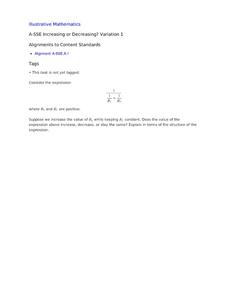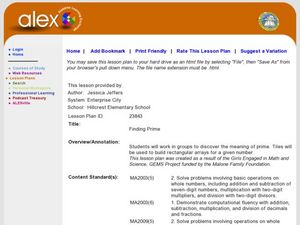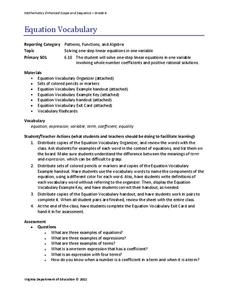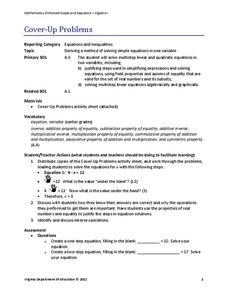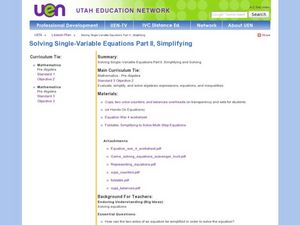Curated OER
Solving Equations Using Models
Explore mathematics by analyzing images. As they view pictures on the SMART Board, individuals must write corresponding algebraic equations. They utilize models to visualize the math expressions.
Curated OER
Multiplication: Bugs Can Multiply, So Can I!
Develop multiplication skills with your class. Youngsters will visualize multiplication as repeated addition. Then they will create a multiplication bug book and discover arrays as a strategy for multiplication problem solving....
Illustrative Mathematics
Operations on the Number Line
A different way to look at integers is on this number line with variables in place of numbers. Learners are to look at different expressions and describe why they think the answer would be positive or negative, depending on the location...
Curated OER
Combining Expressions 2
For this expression worksheet, students combine like terms and perform the indicted operation. They solve problems involving exponents, with multiple variables. There are 15 equations to solve.
Utah Education Network (UEN)
Solving Single-Variable Equations Part II
Brainiacs explore the concept of solving single-variable equations.They use inverse operations to solve equations, and participate in activities such as balancing an equation scale. This is an awesome lesson, complete with game...
EngageNY
Creating and Solving Quadratic Equations in One Variable
Give your classes practice at modeling using quadratic models with a resource that uses area and integer problems to allow individuals to create second degree polynomials. Young mathematicians solve equations using factoring and then...
Curated OER
Increasing or Decreasing? Variation 1
Your algebra learners analyze the value of an algebraic expression to decide if it will increase, decrease, or stay the same when one variable is changed as the others stay constant. Their collaborative efforts culminate with a written...
Curated OER
Increasing or Decreasing? Variation 2
Your algebra learners will manipulate an expression's form in order to make obvious the value of it increasing, decreasing, or staying the same, when one variable is changed as the others stay constant. Your future physicists'...
EngageNY
Multiplying and Factoring Polynomial Expressions (part 2)
If you can multiply binomials, you can factor trinomials! This is the premise for a instructional activity on factoring. Pupils look for patterns in the binomials they multiply and apply them in reverse. Examples include leading...
Illustrative Mathematics
The Sign of Solutions
Positive or negative, zero or no solution, are all possibilities for the solution of a linear equation. Here the resource gives examples of linear equations in one variable and their type of solutions. The resource comes with commentary...
Curated OER
Simplifying Expressions (Multiplication and Division)
Seventh graders simplify algebraic expressions using multiplication and division to combine like items and solve for the variable. They work with inverse operations to solve equations with guided practice. Students complete various...
Alabama Learning Exchange
Finding Prime
Fifth and sixth graders explore prime numbers. They work with a partner to build rectangular arrays using twelve tiles. Factor pairs are noted and recorded on graph paper. Pupils construct rectangular arrays with a prime number and...
Virginia Department of Education
Equation Vocabulary
You'd feel bad if someone called you by the wrong name — and equations are no different. Young mathematicians learn the vocabulary associated with equations and expressions identifying these components in sample equations.
Illustrative Mathematics
Toilet Roll
Potty humor is always a big hit with the school-age crowd, and potty algebra takes this topic to a whole new level. Here the class develops a model that connects the dimensions (radii, paper thickness, and length of paper) of a...
Virginia Department of Education
Exponents and Radicals
What is that fraction doing as an exponent? Fun math games prompt learners to practice evaluating radical expressions and expressions containing rational exponents, both in groups and individually.
Virginia Department of Education
Cover Up Problems
Don't cover up this resource — use it out in the open! Pupils learn how to cover up various parts of a linear equation in order to help solve the equation. A worksheet of problems provides practice with this skill.
EngageNY
Solving a Linear Equation
Solving an equation is the art of creating simpler equivalent equations using properties of equality. Here, classes see that solving an equation is not always as easy as guessing. The lesson presents linear equations that scholars must...
EngageNY
Mixture Problems
What percent of the mixture is juice? Pairs use their knowledge of proportions to determine what percent a mixture is juice given the percent of juice in the components. Pupils use the procedure learned with the juice mixture problem to...
Curated OER
Evaluating Expressions Using Tiles
Sixth graders are shown a variety of algebraic equations. In groups, they use tiles to represent each expression in the equations. To end the lesson, they solve story problems with one and two unknown variables. Individuals share their...
Curated OER
Solving Single-Variable Equations Part II, Simplifying
Seventh graders explore the concept of solving single-variable equations. In this solving single-variable equations lesson, 7th graders discuss how to simplify both sides of an equation. Students discuss using parenthesis and the...
Curated OER
Translating Words to Algebraic Expressions
Seventh graders translate word sentences to algebraic expressions. In groups of three, 7th graders determine the number of times their heart beats in fifteen seconds. Using this data, they calculate the heartbeats per minute, in five...
Curated OER
VARIABLES AND PATTERNS, USE AFTER INVESTIGATION THREE. DISCRETE OR CONTINUOUS LINEAR RELATIONS.
Students discover for which kind of linear function is appropriate to use the "scatter" or the "connected" term. For this lesson, students investigate functions using variables, patterns book, graph paper, rulers and the graphit program.
Curated OER
Lesson Plan 3: Order of Operation
Order of operations is foundational for the future study of algebra. With ample time for instruction and independent practice these activities will help your class improve their understanding of this important concept. Includes the...
Curated OER
The Distributive Property
MIddle schoolers use the distributive property to combine terms in six expressions. They write nine expressions in simplest form. Middle schoolers perform one mental math problem, describing how they would solve the multiplication mentally.





